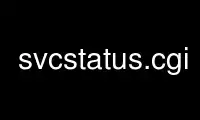
This is the command svcstatus.cgi that can be run in the OnWorks free hosting provider using one of our multiple free online workstations such as Ubuntu Online, Fedora Online, Windows online emulator or MAC OS online emulator
PROGRAM:
NAME
svcstatus.cgi - CGI program to view Xymon status logs
SYNOPSIS
svcstatus.cgi [--historical] [--history={top|bottom}]
DESCRIPTION
svcstatus.cgi is a CGI program to present a Xymon status log in HTML form (ie, as a web
page). It can be used both for the logs showing the current status, and for historical
logs from the "histlogs" directory. It is normally invoked as a CGI program, and therefore
receives most of the input parameters via the CGI QUERY_STRING environment variable.
Unless the "--historical" option is present, the current status log is used. This assumes
a QUERY_STRING environment variable of the form
HOSTSVC=hostname.servicename
where "hostname" is the name of the host with commas instead of dots, and "servicename" is
the name of the service (the column name in Xymon). Such links are automatically
generated by the xymongen(1) tool when the environment contains "XYMONLOGSTATUS=dynamic".
With the "--historical" option present, a historical logfile is used. This assumes a
QUERY_STRING environment variable of the form
HOST=hostname&SERVICE=servicename&TIMEBUF=timestamp
where "hostname" is the name of the host with commas instead of dots, "servicename" is the
name of the service, and "timestamp" is the time of the log. This is automatically
generated by the history.cgi(1) tool.
OPTIONS
--historical
Use a historical logfile instead of the current logfile.
--history={top|bottom|none}
When showing the current logfile, provide a "HISTORY" button at the top or the
bottom of the webpage, or not at all. The default is to put the HISTORY button at
the bottom of the page.
--env=FILENAME
Load the environment from FILENAME before executing the CGI.
--templates=DIRECTORY
Where to look for the HTML header- and footer-templates used when generating the
webpages. Default: $XYMONHOME/web/
--no-svcid
Do not include the HTML tags to identify the hostname/service on the generated web
page. Useful is this already happens in the hostsvc_header template file, for
instance.
--multigraphs=TEST1[,TEST2]
This causes svcstatus.cgi to generate links to service graphs that are split up
into multiple images, with at most 5 graphs per image. This option only works in
Xymon mode. If not specified, only the "disk" status is split up this way.
--no-disable
By default, the info-column page includes a form allowing users to disable and re-
enable tests. If your setup uses the default separation of administration tools
into a separate, password- protected area, then use of the disable- and enable-
functions requires access to the administration tools. If you prefer to do this
only via the dedicated administration page, this option will remove the disable-
function from the info page.
--no-jsvalidation
The disable-function on the info-column page by default uses JavaScript to validate
the form before submitting the input to the Xymon server. However, some browsers
cannot handle the Javascript code correctly so the form does not work. This option
disables the use of Javascript for form-validation, allowing these browsers to use
the disable-function.
--nkconfig=FILENAME
Use FILENAME as the configuration file for the Critical Systems information. The
default is to load this from $XYMONHOME/etc/critical.cfg
Use svcstatus.cgi online using onworks.net services
